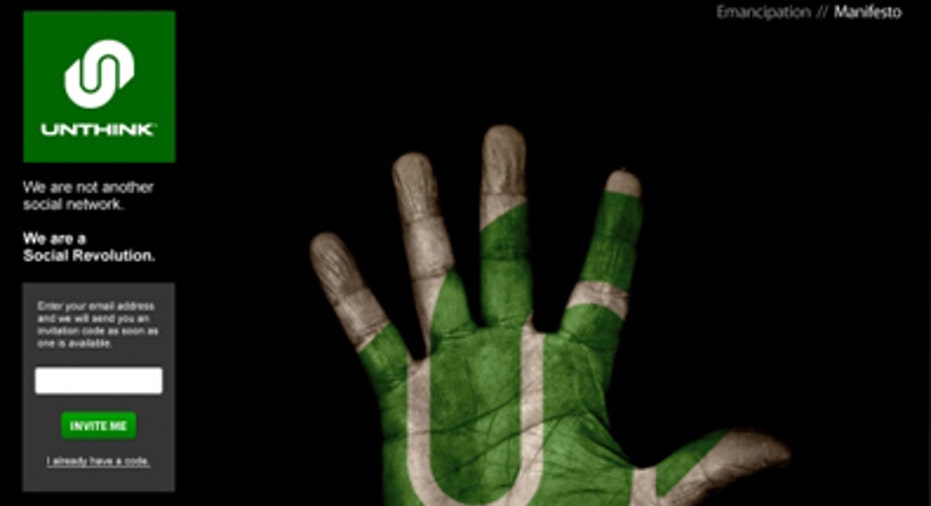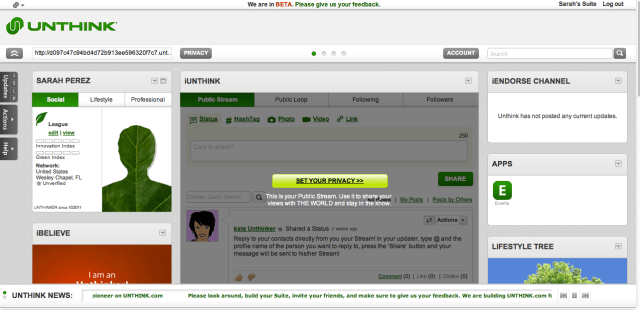Anti-Facebook Social Network 'Unthink' Launches to Public

Scrappy outsider startup Unthink.com, which bills itself as the “anti-Facebook,” is opening up its doors today, allowing in its first round of beta testers. The Tampa-based company with $2.5 million in funding from DouglasBay Capital sees itself as a more open, more honest form of social networking – one where its users are the owners of their data, and not the product being sold to advertisers.
Unthink is the kind of startup that could only come from outside of traditional tech hotspots like Silicon Valley or New York, as there’s a certain level of audacity, and perhaps even ignorance, that you need in order to think you have a shot at displacing social networking giant Facebook and all of its 800 million users.
And taking down Facebook is the core of Unthink’s marketing campaign. In fact, the majority of Unthink’s message is about what it is not: it’s not another social network, it’s a social revolution. Unthinkers are not users, they’re owners. Unthink is not in control, you are. And so on. It even has its own manifesto, deeds and covenants.
“If we want to be free, we have to control our own communications…we have to claim that power,” CEO Natasha Dedis shouted with vitriol to the crowd at September’s Tampa Bay Barcamp (the un-conference), before delving into all the ways that Facebook does its users wrong.
She explained that the idea for Unthink came to her when her son wanted to sign up for Facebook and she read the terms of service. They were not something she wanted to agree to because they could change at any time. But for her son, that decision was met with a lot of anxiety. “He was really stressed about it, like he didn’t have a choice – he had to be on Facebook.” It was either be on Facebook, or be a pariah in school, she said. Whichever decision Dedis made, she felt like she was being bad mother.
 (Above: a profile after sign-up)
(Above: a profile after sign-up)
On Facebook, your personal data, your posts, your likes – in short, all your social networking activity – is used to provide advertisers with a way to directly target precise demographics. Some may call it genius, but for others like Dedis, it feels exploitive.
“The number one thing that had to be ‘un-thought’ about social media, is who does it belong to? We need to own everything that we put on our page. We can be as private or as public as we want, as long as it’s our choice,” she said.
On Unthink, user data isn’t sold to brands. Instead, users choose a brand to sponsor their page, by way of an ad dubbed “iEndorse.” The idea is that a user will select a brand they feel some affinity with, and will then become an advocate for that brand. Users who don’t want to select a brand have the option to pay for the service instead ($2/year).
Brands also have a different way to communicate with fans than they do on Facebook, where messages are spliced into a users’ News Feed. On Unthink, there’s a separate section on users’ profile pages just for communicating with businesses. Users decide what companies they want to communicate with, what type of messages they want to receive and how often they want to receive them. Then, when they choose to interact with a brand, they’re rewarded for their engagement with points that can be used towards discounts and offers from the brand in question.
Upon signing up for Unthink, as I did today, you’re offered an app that will export your photos and videos from Facebook. You’re also asked to fill out the standard social networking questions (name, date of birth, gender, etc.) and are then directed to your own personal profile page.
These pages are split into sections, each with a dedicated purpose and easy-to-customize privacy controls. The top section, “iUnthink” is your public microblog, the middle, your social section, the third, your lifestyle section for connecting with brands (this part will launch in a few weeks), and the bottom, your professional section for connecting with business colleagues.
Oh, that’s right. Did I forget to mention?
Despite its anti-Facebook manifesto, Unthink actually wants to displace Twitter, Groupon and LinkedIn, too. If anything, however, it’s Diaspora done right. Hey, if you’re going to appeal to the “I don’t want corporate control of my data!” crowd, you may as well go all in.Will Unthink take down Facebook? Not likely. But it’s fascinating to watch someone try on this scale.
Unthink is launching into a limited beta today. If you know someone who’s in, they can send you an invite. TechCrunch readers can email techcrunch@unthink.com to get to the head of the list.
This content was originally published on TechCrunch.com.
 More from Tech Crunch:- Keen On… Vinod Khosla: “I’ve Failed More Times Than I’ve Succeeded” (TCTV)- Adidas Launches The SPEED_CELL Workout Tracker- Iranians Upset Over Google Reader Changes
More from Tech Crunch:- Keen On… Vinod Khosla: “I’ve Failed More Times Than I’ve Succeeded” (TCTV)- Adidas Launches The SPEED_CELL Workout Tracker- Iranians Upset Over Google Reader Changes



















